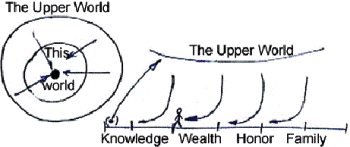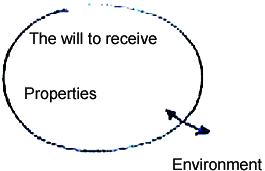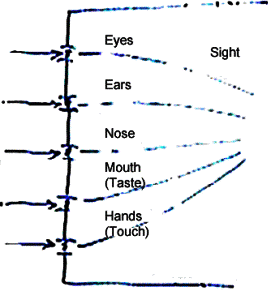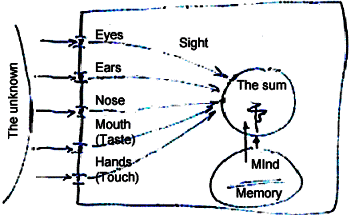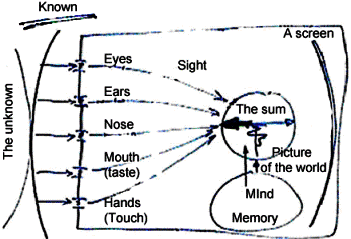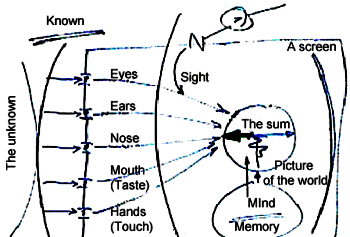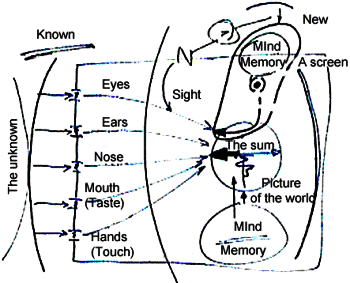The Wisdom of Kabbalah, Lecture 3
-
Bold and in quotes: Original text of Baal HaSulam
-
Regular: Commentaries of Rav Laitman
-
lowercase italics: emphasized words
-
Capitalized italics: transliteration from Hebrew
During previous lessons, we discussed the substance of creation, which is the desire to receive. The Creator created it Yesh mi Ain (existence from absence). However, we do not discuss this from the Creator’s point of view, but rather from man’s position. Man develops and begins to reveal himself in this world in the historical process of his advancement. Because of his development, he arrives at more developed desires, and he leaves his family and his village in order to move to the city. After that, he arrives at the level of the nation, then the level of the whole world. In fact, even the whole world becomes too small for him, and he wants even more.
He begins to understand that he cannot receive satisfaction from anything he does in this world, meaning from his work, family, and his insignificant life. This pushes him to develop further and is especially taking place in our day, when we already have the opportunity to realize all of our desires. However, we see that people who have great opportunities in this world and who do not have boundaries over what they are able to do, are precisely those people who suffer more than everyone else, because they perceive a huge emptiness. They are simply miserable.
Just as we aspire to develop in order to go onto a better situation whenever we perceive emptiness in one state, the same thing apparently occurs with us and with all of humanity today. The emptiness we perceive now, and the forces that are influencing us, are necessary to give us a push toward development in order to ascend to the following level.
However, there exists an additional difficulty here. If we were to develop within the boundaries of this world, we would then at least understand how to develop. For example, slavery existed, and then wars and revolutions took place that led to a more liberal society and the development of industry, and so on. Man passes from one state to another; he becomes freer and more capable of fulfilling himself. However, he always, in a concrete form, sees the next level before him (the following level of his development or man’s development) as a variety of opportunities. There have been many famous individuals in history that ascended and moved humanity in various directions, and it advanced forward for better or for worse.
In the present time, however, we feel that both individuals as well as all humanity are searching and that emptiness is becoming stronger. It is difficult for a person to understand what he should aspire to. This difficulty reaches such a level that people want to block out their desires. For example, they do not want to buy anything new. People have complained to me that they do not want to buy the new telephones of the third generation. They do not want novelties because they also quickly become obsolete. Once upon a time, renewals took place every few years, such as during the Middle Ages, or they took place once every few decades. This happened naturally. In our time, however, something becomes renewed every year.
However, man already understands, feels, and remembers that no novelty will add anything to his life. In this case, why introduce all these novelties? He is already tired of the fact that he is being used in his effort with an empty Kli (vessel) and that he will be unable to receive pleasure in exchange for what others want to sell to him. This is becoming so apparent to him that he no longer wants this kind of advancement. This is the reason for drugs, depression, and disillusionment in technological development. Once upon a time, people thought that this might provide a person with prosperity, freedom, a good sensation and that they would feel some sort of fulfillment from it. What fulfillment?
Today this is even clearer to us, and even the youth are not enticed by such adventures. All of this is a sign that our development on the level of our world has exhausted itself to some degree, and that we have necessities that we do not understand very well. They are pushing us toward a different kind of development.
However, how can we come to this kind of development? Man can neither remain in a state of inaction nor cease to attempt to find meaning for himself. He, nevertheless, wants to fulfill himself with at least something. However, we do not want to develop in a direction that is concealed from us, a direction that we do not understand or feel, and when we do, we only feel a lack; nevertheless, we do not feel it as a goal.
Today, no philosopher or politician can say clearly or with certainty what forms of reality lie ahead for man or the world. Moreover, suppose man does achieve a form that fulfills every desire, one that gives him a genuine perception of freedom, fulfillment, confidence, or even a wonderful perception of life with regard to the youth, adults and so on. Any person can invent any variety of theories, but these can no longer be accepted in the world as possibilities for potential development.
All of this demonstrates that we do not have the solution or the medicine for our condition, and we do not have a goal. This contradicts all development that occurred until now. Long ago, Kabbalists said that the Wisdom of Kabbalah must develop in a state of darkness and despair, meaning, it must manifest and show every person who aspires to advance and to develop what to do with his emptiness and his life. When a person has this desire, the Wisdom of Kabbalah shows him the genuine reality by explaining what occurs beyond this world, how to achieve the consciousness, understanding, and existence in all of reality. That is, he achieves these things not only in this reality but also in a more external reality; he can understand and use it. In addition, when a person draws on the entire universe, he will fulfill himself and achieve an eternal, perfect life that is full of prosperity.
Why? Because the need that is presently manifesting and the one that was revealed over the course of generations passed is the necessity for a fulfillment that comes by attaining the Upper World. This is because all fulfillments come to us from there.
We reside within the limited boundaries of our world.Each of us is a black point. Every fulfillment we receive comes from the Upper World; they pass to us through the Upper World. The fulfillment of every desire experienced over the thousands of years of our development (since about 10,000 years ago until the present day)—for example, of bodily pleasures, money, honors and knowledge, as well as every person’s exact proportion—we have always received from the Upper World. Every fulfillment we have ever received has always been from there.
However, they come to us from above, dressed in our varied animal pleasures. For example, suppose the desire for money comes to a person. Whenever the pleasure comes dressed as money, he is not satisfied. This is because the pleasure has come to him dressed as money; nonetheless, a person prefers pleasure dressed in nothing at all. That is, he wants abstract pleasure. Therefore, the more he chases this clothing the more this aspiration leads him to ever-greater disappointment. Finally, after all these pleasures, he comes to the state where he understands, within his point in the heart, that he does not want such clothing as family, honor, and knowledge. He understands that he needs the source itself, meaning the Upper World from where all pleasures come.
Ultimately, this is what all these clothes, concealments, or external manifestations of pleasures bring us. Our understanding of life, along with our intellect, advances to the level where we begin to realize that there are abstract existences that escape us more and more. However, it is precisely they that contain strength, information, and power, and precisely this can bring us greater pleasure and fulfillment. In this way, our world prepares us for the state where we begin to desire something that is located above matter, located above this clothing: clothing within which pleasures come to us in the form of sex, family, money, honor and knowledge. Instead of these, a person wants the fulfillment itself.
Yet, how do we achieve this? When we observe and analyze the laws of this world, we notice that there is essentially a single law: the law of equivalence of form. This law states that all matter consists in various properties of the desire to receive.Thus, it feels good within its inner attributes when all the attributes are in harmony with the environment or equivalent to it. Every one of us and every element of nature aspire toward this state.
Let us take, for example, the force of universal attraction. When I hold up something and let go of it, this object falls because it aspires to become more equivalent to its environment. What does it mean: “it falls”? It acquires the place, form, and position within which it is maximally balanced with its environment. Every one of us is the same way.
Take the human body as an example; all of its organs are in the state of balance between inner and outer pressures. We can perceive light, sound, but we perceive them only to the degree of our equivalence of form. This also relates to the devices we use in order to measure anything.
How do we measure an incoming electric impulse? The measuring device contains an arrow and an inductive spool through which the electric impulse passes. This spool transforms the impulse into an electromagnetic wave, which then pushes an arrow that is connected to a spring. It is in this way that we measure the balance of a device, a radio, a telescope or a microscope. It does not matter what we build or how it is constructed; everything is constructed on the principle of equivalence of form, or the balance between inner with outer.
Therefore, a person within whom the desire for honor manifests, “smells,” so to speak, where he will be able to develop this desire correctly in order to fulfill himself and where he will be able to receive its fulfillment. He then advances in life by trying out various organizations, books, areas of study—everything he can possibly do in order to achieve this. If the desire for money emerges in him, then he returns to the environment of people who talk about this, who discuss this, and who study how to do this or how to “get ahead” in this. If the desire for knowledge emerges in him, then of course he yearns for the corresponding material, books, and people; he listens and so on.
When the point in the heart awakens in him, he instinctively and quite unconsciously begins the search. He does not know how it happens (I wrote about how I came to Rabash in one of my books), but this brings him to the right place. He suddenly hears that someone is telling him something; he suddenly sees a book or some advertisement in a newspaper. However, millions of people see these advertisements, read these books, and hear some announcement without reacting to them. Yet, he reacts, because he has a point in the heart; he has a desire for this.
Afterwards, he reacts to it. What does this mean? He feels that he can find balance and peace; that he can fulfill the desire that has now manifested in him. In the same way that an electric charge finds its place in an electric field, or an object falls that hangs in the air, or how a piece of metal moves as it chooses its place in a magnetic field, so too does a person come to the necessary and best place. A person chooses a group in just this way. It is said that the Creator or the Upper Force brings him to the correct place.
The Upper Force, or the Creator, is the common law of reality, because nature is the Creator according to Gimatria. It draws a person, as a piece of iron to a magnet, to the place where he is now able to receive fulfillment and development. This is how a person comes to the books, to the group, and this is how he finds an instructor. Therefore, we should not worry about people who do not come. In addition, we should not worry about our loved ones either. Many people come to me with the request to influence their children and loved ones. For example, one wonders why someone’s husband does not want to study. As a rule, this is a very popular question.
When the desire emerges, a person will find the place. However, where there is no desire, we are forbidden to awaken it because everything must develop naturally and gradually. Otherwise, it is considered coercion, and this is against the common law of the spiritual reality, which states that there is no compulsion in the spiritual.
What does it mean, that there is no compulsion in the spiritual? As we observe from generation to generation, humanity has moved along the path of a natural development of its desire. The same is true now, when the point in the heart is awakening in man. Allow it to develop naturally, and in this way a person comes to the correct place and the correct environment.
We have already somewhat discussed how we perceive reality around us.
We are a kind of box with five openings: eyes for sight, ears for hearing, nose for smell, mouth for taste, and hands for touch. (To be more precise regarding touch, it is not only the hands; the whole body possesses this ability.) There also exist sensations that derive from inner organs. However, it is easier to index things this way. In all our sense perceptions, we perceive an external reality that surrounds us according to our equivalence of form to it (or equivalence of our attributes). As I experience pressure on my eyes, ears, the nerve endings of the organs of smell, taste, and touch, I perceive and balance this pressure. That is, I measure it in the same way as the arrow that measures balance. This is how I measure what is coming to me.
When a certain pressure influences me, it takes place within me. I perceive this pressure when it passes through my unique Kli, for example—sight. In this way, I perceive, but this does not mean that there exist visible waves around me. When a pressure excites me or my organ of perception such as my eyes, this stimulus evokes the picture of light or darkness. Pressure on a different organ such as the nerve endings of the organ of smell, or perception of smell, evokes various odors. Influence or pressure on another one of my organs of perception will evoke a bouquet of tastes or a variety of tactile sensations.
That is, I do not know what exists outside, but I imagine that which is unknown to me depending on the reaction of my sense organs. If my sense organs were constructed differently, I would feel, see, hear, and smell in a quite different manner. Maybe I would perceive everything around me as a block of concrete with me inside of it, without any ability to move. Moreover, what I now perceive as light might appear as darkness. On the other hand, maybe everything would be very different. My entire world is what stands before me as the sum of the perceptions of my five sense organs.
At the same time, I have a mind and memory; I have the ability to compare what I see and feel with what I have in my memory. According to this, I evaluate what enters me or my impressions. According to this, I make deductions and begin to understand. Taking into consideration our entire upbringing, experience and previous incarnations, our memory quickly gives us an understanding of our place and how we may utilize it.
After comparing data from our memory and information received from the sense organs, as Baal HaSulam writes, everything passes through a particular screen by which the picture of the world appears, as in a movie theater. It is built only on the information that has impressed us or what we have perceived from the outside, even without knowing what it is. We have also compared it with what we have in our memory and brain. It seems as if this picture is located outside of us and that everyone knows this. However, this is only a mere appearance; it is completely not the case.
Therefore, Kabbalists call our world (meaning what we now imagine to be located in front of us) “the world of illusions.” These things are known and simple, and every person understands this. However, this is not what is most important.
Question: Where does the decision take place that determines which of my sense organs will be affected by the pressure?
All my sense organs are nothing more than sensors or devices for perception that I am able to replace with mechanical or electronic devices. Currently this is being done quite successfully. For example, it is easy to create an artificial eye in place of the natural eye, or to model our nerves in the form of electronic impulses. These things are obvious, and there is nothing special about them.
It is true that we do not possess all the technology for it, but this is only temporary. From nature’s point of view, there are no limitations to man’s ability to do this. We can do practically anything with our animal body. We can change or replace everything in it. We can create a person with all five senses in such a way that there would be no difference between an artificial ear, for example, and our natural biological ear.
We can create an ear that might possess a broader range of correspondence with the external world. In this case, we could hear other creatures, hear sounds that we currently do not hear and see things that we do not see. For example, we would be able to see different colors or to see in the dark. This is not a problem.
The problem consists in the fact that we will always attach our inner picture to this. For example, I can turn off all perceptions that come from a person’s sense organs (I used to do this in the past), and begin influencing them with electric shocks. We can provide an impulse that would cause a person to think that he sees some things or that he is located in another place. Although I do not show him this place, nevertheless according to the signal I give him some sort of memories unravel in his consciousness. In this case, he begins to imagine these things due to the mutual effect of my influence and his memory: he travels somewhere or imagines something abstract.
To be precise, there is nothing genuine in all these perceptions; they do not have a real connection with the external reality. We cannot even say whether it exists at all. All our excitation is internal, and our entire picture of the external world is located within us.
Later, in the Wisdom of Kabbalah, we will study why we are constructed this way and for what purpose. In essence, we are studying all this now as well, as in a lesson in school. This is necessary in order to understand how limited our perceptions are and that all our concepts are internal; they are based on our memory and the reactions of our sense organs. We do not know what is located outside of our sense organs. Moreover, the question arises whether anything exists outside of us at all. I do not know. Does any question about the external and internal even have any meaning? After all, the very concept of “outside” and “inside” may be only an illusion and nothing more.
A desire awakens in us, which is called a “point in the heart.” This desire is not one that stimulates the normal organs of perception. We have a desire to use our organs of perception, such as when I want to see, hear, smell, and understand. To understand is already a sum of desires. Each perception of a sense organ contains many other distinct characteristics that our brain adds. What specific pleasure do I want to feel from sight, sound, smell, or any combination of them?
If I see something beautiful, it should have a particular color, smell and a specific texture. My desire, which stimulates my organs of perception, is very complex. It is based on memories of what gave me pleasure in the past. I arouse this within me and attune my sense organs in such a way that they search for what will give them pleasure. However, this desire is organized relative to my five sense organs, my mind, and my memory.
Suddenly, there emerges a desire called a “point in the heart.” Currently, this desire is awakening in many people, and it does not affect the aforementioned sense organs. They cannot give it any kind of fulfillment. The mind and memory do not exist for it. Everything that relates to the point in the heart is something new, something that does not exist within us. This comes to the surface from a concealed place and begins to confuse us by separating us from our perceptions and memories.
We already perceive that we do not want any of this and that we are bored with this life. I do not know where to derive pleasure; I do not know what to do, and I force myself to move with difficulty. A modern person speaks this way. The reason for this is that the memory, the mind, and the point in the heart are coming from a new Kli (vessel) called the “soul.” After this Kli, a new screen will emerge to show a person a new reality. This reality differs from the previous one in which he saw this world. It is a completely different mechanism. If a person develops it, then this point in the heart will become an additional sixth organ of perception. In this case, the mind and memory will acquire a different development, and through this system, a person will see a completely different picture.
However, a question arises: will this new picture be just as illusory and dependent on my sense organs and dependent on the way I conceive of it, and call it the external world? It is not an external world at all. Is it possible that we are not located in an external reality? Alternatively, will I be able to describe what I shall perceive as something located outside of me? Or, could it be that one of my systems will be called the external and the internal as opposed to some other? We will talk more about this later.
However, undoubtedly, the development that nature compels me to acquire is completely different. This new path is directed toward manifesting completely new things and revealing new horizons.
